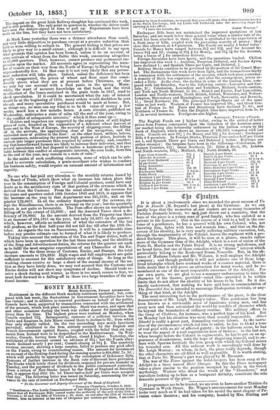No one who has ktid any attention to the monthly
returns issued by the Board of Trade, which show what an increase has taken place this year in the consumption of Foreign and Colonial produce, could have any doubt as to the satisfactory state of that portion of the revenue which is derived from the Customs. From the usual abstract of the revenue fur the increase and quarters ended 10th October 1852 and 1853, it appears that the incriese on the year in that department was 361,5191., and on the itiartei 120,6671. In all the ordinary departments of the revenue, ex- oept the Miscellaneous, there is an increase on the year ; but the quarterly 'return is not quite so favourable. The Post-office shows an unexplained falling-off to the extent of 25,0001. ; and the Assessed Taxes show a de- ficiency of 29,9961. In the amount derived from the Property-tax there is an increase of 204,1911. on the year, but only 24,4671. on the quarter ; which, however, affords no indication of what the extension of the tax will produce, as the first half-year did not fall due till after the 10th Oc- tober. As regards the tax on Successions, it will be a considerable time before any precise estimate can be formed of what it is likely to produce. Taking into account the reduction of the Tea and Sugar duties, both of which have been in operation for the last three months, and the abolition of the Soap and Advertisement duties, the returns for the quarter are such as to fulfil the most sanguine expectations of any Chancellor of the Ex- chequer. On the three items of Customs, Excise, and Stamps, the total increase amounts to 224,8831. High wages and full employment are quite sufficient to account for this satisfactory state of things. So long as the working classes receive so large a share of the annual income of the na- tion as they have lately done, we may rest assured that the Customs and Excise duties will not show any symptoms of decline. Should trade re- ceive a shock during next winter, as there is too much reason to fear, we must look forward to a falling-off in those two large branches of the na- tional income.


























 Previous page
Previous page